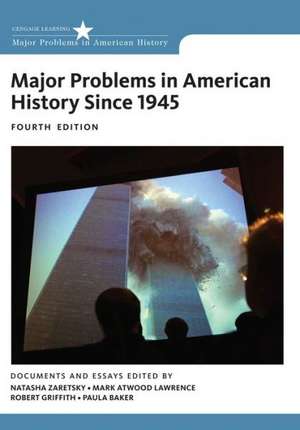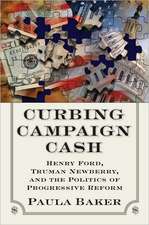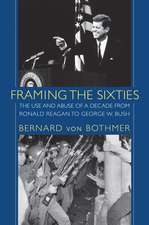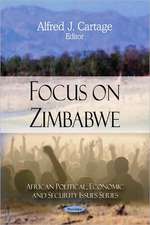Major Problems in American History Since 1945: Major Problems in American History
Autor Robert Griffith, Paula Baker, Natasha Zaretsky, Mark Lawrenceen Limba Engleză Paperback – 26 sep 2013
Preț: 367.47 lei
Preț vechi: 454.23 lei
-19% Nou
Puncte Express: 551
Preț estimativ în valută:
70.32€ • 73.60$ • 58.52£
70.32€ • 73.60$ • 58.52£
Carte disponibilă
Livrare economică 10-24 martie
Livrare express 22-28 februarie pentru 79.49 lei
Preluare comenzi: 021 569.72.76
Specificații
ISBN-13: 9781133944140
ISBN-10: 1133944140
Pagini: 575
Ilustrații: black & white illustrations
Dimensiuni: 160 x 229 x 25 mm
Greutate: 0.82 kg
Ediția:4 Rev ed.
Editura: Cengage Learning
Seria Major Problems in American History
ISBN-10: 1133944140
Pagini: 575
Ilustrații: black & white illustrations
Dimensiuni: 160 x 229 x 25 mm
Greutate: 0.82 kg
Ediția:4 Rev ed.
Editura: Cengage Learning
Seria Major Problems in American History
Notă biografică
Cuprins
1.THE ORIGINS OF THE COLD WAR ERA. Documents. Confronting the Implications of the Atomic Bomb, May 1945. U.S. Diplomat George F. Kennan Warns of an Implacable Enemy, 1946. Secretary of Commerce Henry A. Wallace Urges a Conciliatory Approach, 1946. Soviet Ambassador Nikolai Novikov Reports on the U.S. Drive for World Supremacy, September 1946. President Harry S. Truman Declares World Split Into Two Ways of Life, 1947. Senator Joseph McCarthy Charges the Democrats are "Soft on Communism," 1950. The President's Advisers Urge Military Expansion (NSC-68), April 1950. Hollywood Screenwriter Lillian Hellman Defies Anticommunist Investigators, 1952. Essays. Melvyn P. Leffler, Incompatible Visions of the Postwar Era. Ellen Schrecker, Anticommunism at Home. 2.THE CONSUMER'S REPUBLIC: MASS CULTURE, CONSUMER MARKETS, AND IDENTITY IN THE 1950S. Documents. U.S. Business Celebrates the "Miracle of America," 1948. Scene Magazine Reaches Out to Japanese American Youth, 1952. U.S. News and World Report Assesses the Perils of Mass Culture and the Evils of Television, 1955. 7-Up Appeals to the Teen Market, 1957. Vance Packard Warns Against the Hidden Persuaders, 1957. E. Franklin Frazier Critiques the Black Bourgeoisie, 1957. Life Magazine Identifies a New Teen-age Market, 1959. Advertisers Discover the African American Urban Market, 1964. Essays. Roland Marchand, Visions of Classlessness . Lizabeth Cohen, Lessons in Class. 3. TO THE BRINK: BERLIN, CUBA, AND THE THREAT OF NUCLEAR WAR. Documents. White House Committee Urges Military Build-Up, 1957. President Dwight D. Eisenhower Warns of a "Military-Industrial Complex," 1961. President John F. Kennedy Declares Sweeping Global Ambitions, 1961. Rusk Examines U.S. Failures at the Bay of Pigs, 1961. President Kennedy Warns of American Resolve in Berlin, 1961. Life Magazine Instructs on Building Fallout Shelters, 1961. U.S. Leaders Debate Options during the Missile Crisis, 1962. U.S. and Soviet Leaders Find a Formula to End the Cuban Missile Crisis, 1962. Essays. George C. Herring, Ideology and Ambition. Julian E. Zelizer, Domestic Pressures for Toughness. 4. EQUALITY, FREEDOM, AND POWER: THE CIVIL RIGHTS REVOLUTION. Documents. The New York Times Reports a Murder in Georgia, 1946. The Supreme Court Rules on Brown v. Board of Education, 1954. Jo Ann Robinson Remembers the Montgomery Bus Boycott, 1955. Martin Luther King Delivers "I Have a Dream" Speech, 1963. Anne Moody Describes a Sit-in in Jackson, Mississippi, May 28, 1963. Malcolm X Explores the Philosophy of Black Nationalism, 1964. The Black Panther Party Explains its Goals and Beliefs, 1966. Essays. Charles M. Payne, The View from the Trenches. Thomas J. Sugrue, The Continuing Racial Crisis. 5. THE GREAT SOCIETY AND THE POLITICS OF LIBERAL REFORM. Documents. Author Michael Harrington Calls Attention to Poverty, 1962. Activist Rachel Carson Warns of Environmental Dangers, 1962. President Lyndon B. Johnson Announces His Program for a "Great Society," 1964. Landmark Legislation Targets Poverty, 1964. Governor Ronald Reagan Warns of the Dangers of the Welfare State, 1964. A Great Society Official Remembers Promise and Problems, 1966-1967 (1970). The Vietnam War Conflicts with the Great Society, 1967. Conservative Strategist Kevin Phillips Hails an "Emerging Republican Majority," 1969. Essays. James T. Patterson, The Heyday of Liberal Reform. Maurice Isserman and Michael Kazin, The Limits of the Great Society. 6. THE NEW RADICALISM OF THE 1960S. Documents. C. Wright Mills Calls for a New Left, 1960. Students for a Democratic Society Calls for a Profound Reappraisal of American Society, 1962. Timothy Leary Celebrates Drug Use, 1967. Columbia University Students Explain their Protest, 1968. FBI Wages a Secret Campaign against the New Left, 1968-1971 (1976). Vice President Spiro T. Agnew Lashes Out at Radicals, 1969. A Pollster Reports on "The Big Chill," 1974. Essays. Jeremi Suri, The Sources of Radicalism. Hugh Heclo, The Sixties and the Origins of "Postmodern" America. 7. FROM THE FEMININE MYSTIQUE TO WOMEN'S LIBERATION: FEMINIST POLITICS IN THE 1960S AND 1970S. Documents. Betty Friedan Uncovers "The Problem that Has No Name," 1963. NOW Issues its Statement of Purpose, 1966. Margaret Cerullo Remembers an Illegal Abortion, 1968. Pauli Murray Calls for the Liberation of Black Women, 1970. Feminists Speak Out Against the Miss America Pageant, 1970. Radicalesbians Explore the Meaning of "The Woman-Identified Woman," 1970. Black Feminists Speak Out, 1977. Essays. Nancy MacLean, Title VII and the Fight Against Workplace Sex Discrimination. Alice Echols, Women's Liberation and Sixties Radicalism. 8. VIETNAM AND THE CRISIS OF AMERICAN EMPIRE. Documents. The Vietnamese Declare Their Independence, 1945. President Dwight D. Eisenhower Explains the Domino Theory, 1954. Geneva Agreement Divides Vietnam into North and South, 1954. A South Vietnamese Peasant Explains Why He Joined the Vietcong, 1961. President Lyndon Johnson's Advisers Debate Expanding the War, 1965. A Dissenter Dissects Liberalism, 1965. A Soldier Remembers His Ordeal, 1968 (1981). Henry Kissinger Shares His Doubts with President Nixon, 1969. Essays. Michael Lind, A Necessary War. Fredrik Logevall, An Avoidable Catastrophe. 9. A NEW AGE OF LIMITS: AMERICA AND THE WORLD IN THE 1970S. Documents. Biologist Paul Ehrlich Describes the Coming Population Explosion, 1968. Activist Carl Wittman Issues a "Gay Manifesto," 1970. A Bestseller Predicts the End Times, 1970. Phyllis Schlafly Explains What's Wrong with Equal Rights for Women, 1972. President Nixon Addresses the Nation on Energy Shortages, 1973. Time Magazine Editors Urge President Nixon to Resign, Time Magazine, November 12, 1973.Two Local Residents Respond to the Nuclear Accident at Three Mile Island, 1979. Evangelical Reverend Jerry Falwell Calls on Americans to Return to Biblical Morality, 1980. Essays. Jefferson Cowie, Something's Happening to People Like Me. Meg Jacobs, The Conservative Struggle and the Energy Crisis. 10. POLITICAL AND POPULAR CULTURES OF THE 1980S. Documents. Americans Respond to the Iranian Hostage Crisis, 1980. Presidential Candidate Ronald Reagan Calls for New Economic Policies, 1980. Jonathan Schell Describes a Nuclear Bomb Attack on New York City, 1982. President Reagan Proclaims America's "Spiritual Reawakening," 1983. Apple Introduces the First Macintosh Computer, 1984. Libertarian Political Scientist Charles Murray Describes the Failures of the Welfare State, 1984. A Gay Rights Activist Responds to the AIDS Crisis, 1988. Environmentalist Bill McKibben Describes the End of Nature, 1989. Essays. Melani McAlister, Iran, Islam, and the Terrorist Threat. Bradford Martin, The Shock Troops of Direct Action: ACT UP Confronts the AIDS Crisis. 11. LATE CAPITALISM AND THE RISE OF GLOBALIZATION: WORK, LABOR, AND INEQUALITY IN THE NEW CENTURY. Documents. New Democrats Hail the New Economy, 1998. Social Critic Barbara Ehrenreich Describes Working at Walmart, 2001. "Americans for Democratic Action Reports Growing Poverty and Inequality." An Immigrant Garment Worker Describes the Contemporary Sweatshop, 2001. Nobel Winning Economist Paul Krugman Explores the Origins of the 2008 Financial Crisis, 2009. The New York City General Assembly of the Occupy Movement Issues a Declaration, 2011. The New York Times Exposes Working Conditions of Chinese Factories where Apple Products are Assembled, 2012. Essays. Barry Lynn, Unmade in America: The True Cost of a Global Assembly Line. Bethany Moreton, Service Work and the Service Ethos. 12. THE 1990S AND THE SEARCH FOR POST-COLD WAR PRIORITIES. Documents. Political Theorist Francis Fukuyama Declares the "End of History," 1989. President George H.W. Bush Calls for a New World Order, 1990. Political Scientist Samuel Huntington Predicts Turmoil and War, 1993. Senator Al Gore Calls for New Focus on the Environment, 1992. Republicans Propose a "Contract with America," 1994. President Bill Clinton Warns against New Isolationism, 1995. President Clinton Ends "Welfare as We Know It," 1996. American Voters Split by Income, Education, Race, 2000. Essays. Sean Wilentz, Finding a New Political Center. Peter Beinart, Setting the Agenda for the Unipolar Era. 13. POST-RACIAL AMERICA OR A NEW JIM CROW? CONTEMPORARY DEBATES ABOUT RACE, ETHNICITY, AND IMMIGRATION. Documents. Immigrants Come to America, 1900-2010. Proposition 187: Californians Seek to Close the Door to Undocumented Immigrants, 1994. A Pakistini Immigrant Becomes a Suspect after 9/11, 2005. A Survivor Recalls Hurricane Katrina, 2005. Congressman Gary Miller Calls for Stricter Immigration Legislation, 2006. Senator Barack Obama Calls for a More Perfect Union, 2008. A Cartoonist Satirizes Anti-Obama Stereotypes, 2008. Eighteen Year-Old Ola Kaso Provides Testimony on The Dream Act, 2011. Essays. George J. Sanchez, Race, Immigration, and Nativism. Heather Ann Thompson, Why Mass Incarceration Matters: Rethinking Crisis, Decline, and Transformation in Postwar American History. 14. THE UNITED STATES IN THE WORLD SINCE 9/11. Documents. Osama Bin Laden Declares Jihad Against America, 1998. President George W. Bush Examines Sources of Anti-Americanism, 2001.The Bush Administration Declares a New National Security Strategy, 2002. Senator Robert C. Byrd Charges "The Emperor Has No Clothes," 2003. An Army Officer Ponders the Fight for Hearts and Minds in Iraq, 2004. U.S. Department of Justice Authorizes CIA to Use Harsh Interrogation Methods, 2005. Americans Face Competing Priorities at Home and Abroad, 2010. Defense Department Foresees New National Security Threats, 2010. Essays. Niall Ferguson, The Benefits of a Liberal Empire. Thomas L. Friedman and Michael Mandelbaum, Domestic Dysfunctions and American Decline.
Recenzii
1.THE ORIGINS OF THE COLD WAR ERA. Documents. Confronting the Implications of the Atomic Bomb, May 1945. U.S. Diplomat George F. Kennan Warns of an Implacable Enemy, 1946. Secretary of Commerce Henry A. Wallace Urges a Conciliatory Approach, 1946. Soviet Ambassador Nikolai Novikov Reports on the U.S. Drive for World Supremacy, September 1946. President Harry S. Truman Declares World Split Into Two Ways of Life, 1947. Senator Joseph McCarthy Charges the Democrats are "Soft on Communism," 1950. The President's Advisers Urge Military Expansion (NSC-68), April 1950. Hollywood Screenwriter Lillian Hellman Defies Anticommunist Investigators, 1952. Essays. Melvyn P. Leffler, Incompatible Visions of the Postwar Era. Ellen Schrecker, Anticommunism at Home. 2.THE CONSUMER'S REPUBLIC: MASS CULTURE, CONSUMER MARKETS, AND IDENTITY IN THE 1950S. Documents. U.S. Business Celebrates the "Miracle of America," 1948. Scene Magazine Reaches Out to Japanese American Youth, 1952. U.S. News and World Report Assesses the Perils of Mass Culture and the Evils of Television, 1955. 7-Up Appeals to the Teen Market, 1957. Vance Packard Warns Against the Hidden Persuaders, 1957. E. Franklin Frazier Critiques the Black Bourgeoisie, 1957. Life Magazine Identifies a New Teen-age Market, 1959. Advertisers Discover the African American Urban Market, 1964. Essays. Roland Marchand, Visions of Classlessness . Lizabeth Cohen, Lessons in Class. 3. TO THE BRINK: BERLIN, CUBA, AND THE THREAT OF NUCLEAR WAR. Documents. White House Committee Urges Military Build-Up, 1957. President Dwight D. Eisenhower Warns of a "Military-Industrial Complex," 1961. President John F. Kennedy Declares Sweeping Global Ambitions, 1961. Rusk Examines U.S. Failures at the Bay of Pigs, 1961. President Kennedy Warns of American Resolve in Berlin, 1961. Life Magazine Instructs on Building Fallout Shelters, 1961. U.S. Leaders Debate Options during the Missile Crisis, 1962. U.S. and Soviet Leaders Find a Formula to End the Cuban Missile Crisis, 1962. Essays. George C. Herring, Ideology and Ambition. Julian E. Zelizer, Domestic Pressures for Toughness. 4. EQUALITY, FREEDOM, AND POWER: THE CIVIL RIGHTS REVOLUTION. Documents. The New York Times Reports a Murder in Georgia, 1946. The Supreme Court Rules on Brown v. Board of Education, 1954. Jo Ann Robinson Remembers the Montgomery Bus Boycott, 1955. Martin Luther King Delivers "I Have a Dream" Speech, 1963. Anne Moody Describes a Sit-in in Jackson, Mississippi, May 28, 1963. Malcolm X Explores the Philosophy of Black Nationalism, 1964. The Black Panther Party Explains its Goals and Beliefs, 1966. Essays. Charles M. Payne, The View from the Trenches. Thomas J. Sugrue, The Continuing Racial Crisis. 5. THE GREAT SOCIETY AND THE POLITICS OF LIBERAL REFORM. Documents. Author Michael Harrington Calls Attention to Poverty, 1962. Activist Rachel Carson Warns of Environmental Dangers, 1962. President Lyndon B. Johnson Announces His Program for a "Great Society," 1964. Landmark Legislation Targets Poverty, 1964. Governor Ronald Reagan Warns of the Dangers of the Welfare State, 1964. A Great Society Official Remembers Promise and Problems, 1966-1967 (1970). The Vietnam War Conflicts with the Great Society, 1967. Conservative Strategist Kevin Phillips Hails an "Emerging Republican Majority," 1969. Essays. James T. Patterson, The Heyday of Liberal Reform. Maurice Isserman and Michael Kazin, The Limits of the Great Society. 6. THE NEW RADICALISM OF THE 1960S. Documents. C. Wright Mills Calls for a New Left, 1960. Students for a Democratic Society Calls for a Profound Reappraisal of American Society, 1962. Timothy Leary Celebrates Drug Use, 1967. Columbia University Students Explain their Protest, 1968. FBI Wages a Secret Campaign against the New Left, 1968-1971 (1976). Vice President Spiro T. Agnew Lashes Out at Radicals, 1969. A Pollster Reports on "The Big Chill," 1974. Essays. Jeremi Suri, The Sources of Radicalism. Hugh Heclo, The Sixties and the Origins of "Postmodern" America. 7. FROM THE FEMININE MYSTIQUE TO WOMEN'S LIBERATION: FEMINIST POLITICS IN THE 1960S AND 1970S. Documents. Betty Friedan Uncovers "The Problem that Has No Name," 1963. NOW Issues its Statement of Purpose, 1966. Margaret Cerullo Remembers an Illegal Abortion, 1968. Pauli Murray Calls for the Liberation of Black Women, 1970. Feminists Speak Out Against the Miss America Pageant, 1970. Radicalesbians Explore the Meaning of "The Woman-Identified Woman," 1970. Black Feminists Speak Out, 1977. Essays. Nancy MacLean, Title VII and the Fight Against Workplace Sex Discrimination. Alice Echols, Women's Liberation and Sixties Radicalism. 8. VIETNAM AND THE CRISIS OF AMERICAN EMPIRE. Documents. The Vietnamese Declare Their Independence, 1945. President Dwight D. Eisenhower Explains the Domino Theory, 1954. Geneva Agreement Divides Vietnam into North and South, 1954. A South Vietnamese Peasant Explains Why He Joined the Vietcong, 1961. President Lyndon Johnson's Advisers Debate Expanding the War, 1965. A Dissenter Dissects Liberalism, 1965. A Soldier Remembers His Ordeal, 1968 (1981). Henry Kissinger Shares His Doubts with President Nixon, 1969. Essays. Michael Lind, A Necessary War. Fredrik Logevall, An Avoidable Catastrophe. 9. A NEW AGE OF LIMITS: AMERICA AND THE WORLD IN THE 1970S. Documents. Biologist Paul Ehrlich Describes the Coming Population Explosion, 1968. Activist Carl Wittman Issues a "Gay Manifesto," 1970. A Bestseller Predicts the End Times, 1970. Phyllis Schlafly Explains What's Wrong with Equal Rights for Women, 1972. President Nixon Addresses the Nation on Energy Shortages, 1973. Time Magazine Editors Urge President Nixon to Resign, Time Magazine, November 12, 1973.Two Local Residents Respond to the Nuclear Accident at Three Mile Island, 1979. Evangelical Reverend Jerry Falwell Calls on Americans to Return to Biblical Morality, 1980. Essays. Jefferson Cowie, Something's Happening to People Like Me. Meg Jacobs, The Conservative Struggle and the Energy Crisis. 10. POLITICAL AND POPULAR CULTURES OF THE 1980S. Documents. Americans Respond to the Iranian Hostage Crisis, 1980. Presidential Candidate Ronald Reagan Calls for New Economic Policies, 1980. Jonathan Schell Describes a Nuclear Bomb Attack on New York City, 1982. President Reagan Proclaims America's "Spiritual Reawakening," 1983. Apple Introduces the First Macintosh Computer, 1984. Libertarian Political Scientist Charles Murray Describes the Failures of the Welfare State, 1984. A Gay Rights Activist Responds to the AIDS Crisis, 1988. Environmentalist Bill McKibben Describes the End of Nature, 1989. Essays. Melani McAlister, Iran, Islam, and the Terrorist Threat. Bradford Martin, The Shock Troops of Direct Action: ACT UP Confronts the AIDS Crisis. 11. LATE CAPITALISM AND THE RISE OF GLOBALIZATION: WORK, LABOR, AND INEQUALITY IN THE NEW CENTURY. Documents. New Democrats Hail the New Economy, 1998. Social Critic Barbara Ehrenreich Describes Working at Walmart, 2001. "Americans for Democratic Action Reports Growing Poverty and Inequality." An Immigrant Garment Worker Describes the Contemporary Sweatshop, 2001. Nobel Winning Economist Paul Krugman Explores the Origins of the 2008 Financial Crisis, 2009. The New York City General Assembly of the Occupy Movement Issues a Declaration, 2011. The New York Times Exposes Working Conditions of Chinese Factories where Apple Products are Assembled, 2012. Essays. Barry Lynn, Unmade in America: The True Cost of a Global Assembly Line. Bethany Moreton, Service Work and the Service Ethos. 12. THE 1990S AND THE SEARCH FOR POST-COLD WAR PRIORITIES. Documents. Political Theorist Francis Fukuyama Declares the "End of History," 1989. President George H.W. Bush Calls for a New World Order, 1990. Political Scientist Samuel Huntington Predicts Turmoil and War, 1993. Senator Al Gore Calls for New Focus on the Environment, 1992. Republicans Propose a "Contract with America," 1994. President Bill Clinton Warns against New Isolationism, 1995. President Clinton Ends "Welfare as We Know It," 1996. American Voters Split by Income, Education, Race, 2000. Essays. Sean Wilentz, Finding a New Political Center. Peter Beinart, Setting the Agenda for the Unipolar Era. 13. POST-RACIAL AMERICA OR A NEW JIM CROW? CONTEMPORARY DEBATES ABOUT RACE, ETHNICITY, AND IMMIGRATION. Documents. Immigrants Come to America, 1900-2010. Proposition 187: Californians Seek to Close the Door to Undocumented Immigrants, 1994. A Pakistini Immigrant Becomes a Suspect after 9/11, 2005. A Survivor Recalls Hurricane Katrina, 2005. Congressman Gary Miller Calls for Stricter Immigration Legislation, 2006. Senator Barack Obama Calls for a More Perfect Union, 2008. A Cartoonist Satirizes Anti-Obama Stereotypes, 2008. Eighteen Year-Old Ola Kaso Provides Testimony on The Dream Act, 2011. Essays. George J. Sanchez, Race, Immigration, and Nativism. Heather Ann Thompson, Why Mass Incarceration Matters: Rethinking Crisis, Decline, and Transformation in Postwar American History. 14. THE UNITED STATES IN THE WORLD SINCE 9/11. Documents. Osama Bin Laden Declares Jihad Against America, 1998. President George W. Bush Examines Sources of Anti-Americanism, 2001.The Bush Administration Declares a New National Security Strategy, 2002. Senator Robert C. Byrd Charges "The Emperor Has No Clothes," 2003. An Army Officer Ponders the Fight for Hearts and Minds in Iraq, 2004. U.S. Department of Justice Authorizes CIA to Use Harsh Interrogation Methods, 2005. Americans Face Competing Priorities at Home and Abroad, 2010. Defense Department Foresees New National Security Threats, 2010. Essays. Niall Ferguson, The Benefits of a Liberal Empire. Thomas L. Friedman and Michael Mandelbaum, Domestic Dysfunctions and American Decline.













